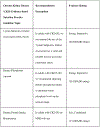Evaluating the Implementation of Evidence-based Kidney Nutrition Practice Guidelines: The AUGmeNt Study Protocol
- PMID: 34728124
- PMCID: PMC9733590
- DOI: 10.1053/j.jrn.2021.09.006
Evaluating the Implementation of Evidence-based Kidney Nutrition Practice Guidelines: The AUGmeNt Study Protocol
Abstract
Evidence-based nutrition practice guidelines (EBNPGs) inform registered dietitian nutritionist (RDN) care for patients with chronic kidney disease grade 5 treated by dialysis; however, there has been little evaluation of best practices for implementing EBNPGs. In this effectiveness-implementation hybrid study with a quasi-experimental design, United States RDNs in hemodialysis clinics will document initial and follow-up nutrition care for patients with chronic kidney disease grade 5 treated by dialysis using the Academy of Nutrition and Dietetics Health Informatics Infrastructure before and after being randomly assigned to a training model: (1) EBNPG knowledge training or (2) EBNPG knowledge training plus an implementation toolkit. The aims of the study include examining congruence of RDN documentation of nutrition care with the EBNPG; describing common RDN-reported EBNPG acceptability, adoption, and adaptation issues; and determining the feasibility of estimating the impact of RDN care on nutrition-related patient outcomes. The AUGmeNt study can inform effective development and implementation of future EBNPGs. Keywords: Chronic kidney diseases; medical nutrition therapy; implementation science; clinical practice guideline; nutrition care process terminology; dietitian.
Copyright © 2021 National Kidney Foundation, Inc. Published by Elsevier Inc. All rights reserved.
Figures







References
-
- National Kidney Foundation. Facts About Chronic Kidney Disease. https://www.kidney.org/atoz/content/about-chronic-kidney-disease. Accessed October 30, 2020.
-
- Center for Disease Control and Prevention. Chronic Kidney Disease Basics | Chronic Kidney Disease Initiative | CDC. https://www.cdc.gov/kidneydisease/basics.html. Accessed October 30, 2020.
-
- Levey AS, Eckardt KU, Dorman NM, et al. Nomenclature for kidney function and disease: report of a kidney disease: Improving global outcomes (KDIGO) consensus conference. Kidney Int. 2020;97:1117–1129. - PubMed
-
- United States Renal Data System. US Renal Data System 2019 Annual Data Report: Epidemiology of Kidney Disease in the United States. National Institutes of Health, National Institute of Diabetes and Digestive and Kidney Diseases. https://www.usrds.org/2019/view/USRDS_2019_ES_final.pdf. Accessed July 1, 2020.
-
- United States Renal Data System. Chapter 1: Incidence, Prevalence, Patient Characteristics, and Treatment Modalities. National Institutes of Health, National Institute of Diabetes and Digestive and Kidney Diseases. https://www.usrds.org/2018/view/v2_01.aspx. Accessed July 1, 2020.
Publication types
MeSH terms
Grants and funding
LinkOut - more resources
Full Text Sources
Medical

